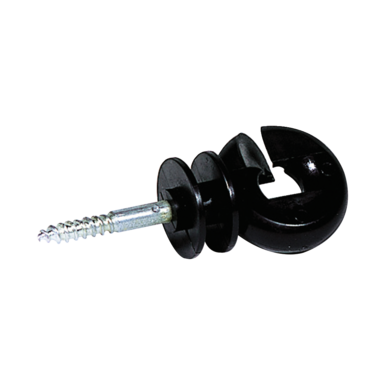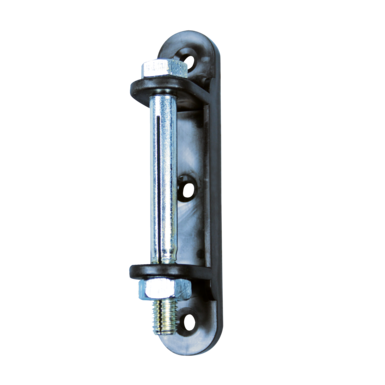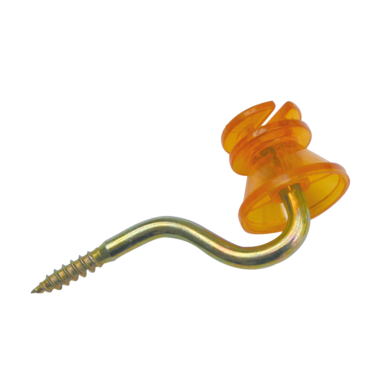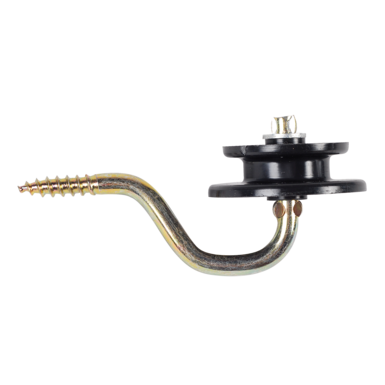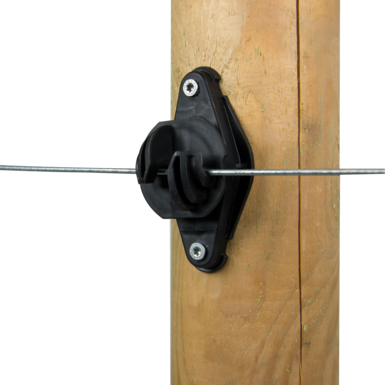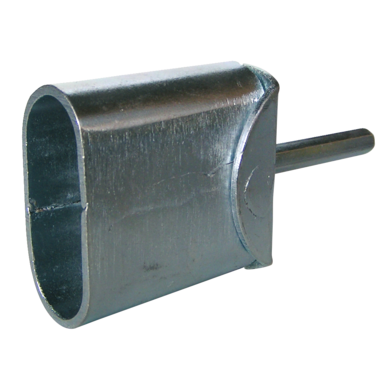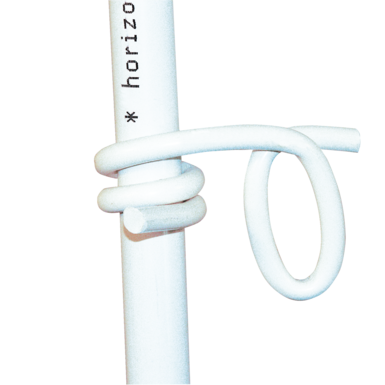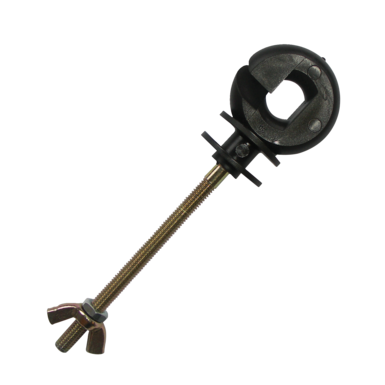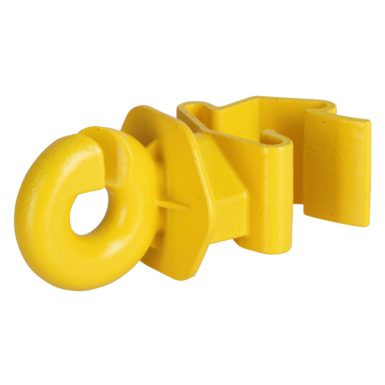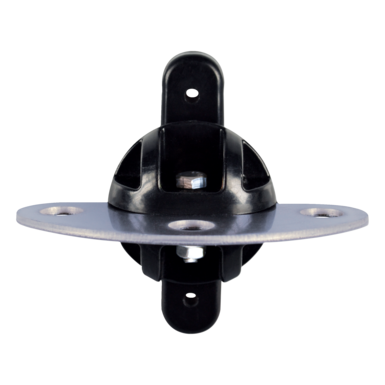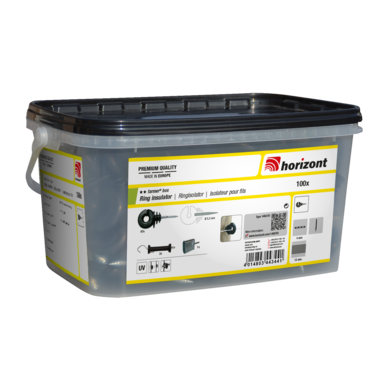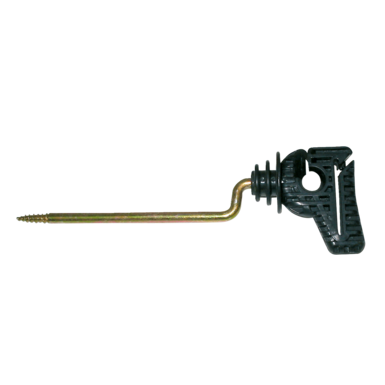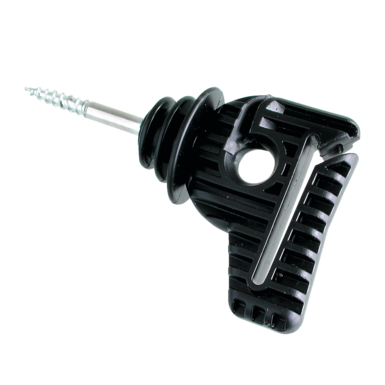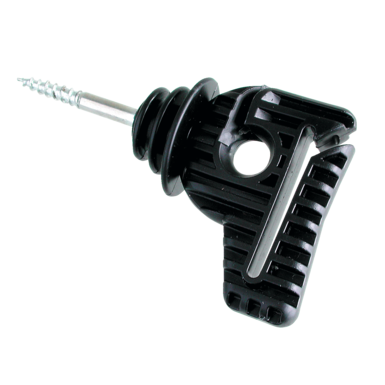Insulators
Good insulation on the pasture fence is particularly important. With a wide range of ring insulators, strand insulators and screw-in aids, there is an ideal product for every application.
Choose Category
horizont Ring insulator ranger plus | up to 4 mm
- Very high dielectric strength up to 30,000 V
- Large drying space = High insulation
- Flexible use for tape up to 13 mm and stranded wire up to 4 mm
- Suitable as section insulator and initial and corner insulator
horizont tape insulator combi 40 | long support | 10 pieces
- Flexible use for tape up to 40 mm, strand up to 4 mm, rope up to 8 mm
- Suitable as distance insulator and section insulator
- UV resistant plastic
- Large drying space = High insulation
horizont Tape insulator combi 40 | short support | 30 pieces
- Flexible use for tape up to 40 mm, strand up to 4 mm, rope up to 8 mm
- Suitable as section insulator and initial and corner insulator
- UV resistant plastic
- Large drying space = High insulation
horizont Tape insulator combi 40 | short support | 80 pieces
- Flexible use for tape up to 40 mm, strand up to 4 mm, rope up to 8 mm
- Suitable as section insulator and initial and corner insulator
- UV resistant plastic
- Large drying space = High insulation
Pasture fence insulators for a reliable electric fence
Most pastures nowadays have an electric fence. Accordingly, the right insulators are especially important to prevent neither humans nor animals from injuring themselves on the fence and to have a carefree electric line. To help you find the right insulator, we have provided a compact overview here.
Why do I need a pasture fence insulator?
Insulators help to keep the pasture fence system running smoothly. They prevent unnecessary discharges of electrical impulses into the ground. They also guide the conductor material and insulate it from the posts. You can also tell whether the right pasture fence insulator has been chosen by whether the conductor material is sagging or taut.
What should be taken into account?
It is very important that the conductor material is always taut and does not sag. If this is the case, you have to tighten it. You can use a tensioner for this, which makes it particularly easy. Warning signs should also be attached to the electric fence to warn passers-by about the electric fence.
What types of electric fence insulators are there?
Depending on the conductor material used, you will need different insulators.
Ring insulators:
The ring insulator is the classic insulator and can be used for pasture fence strands, pasture fence ropes and narrow pasture fence tape. It has a metric thread and is made of a particularly UV-resistant plastic.
Tape insulators:
If you use a pasture fence tape, you need a tape insulator. These come in different variations and designs. Usually, an insulator with a clip is used, which makes it easy to clamp the tape. It is particularly quick to fit and has a simple locking mechanism.
Rope insulators:
Ropes can be insulated with the classic ring insulator. However, it has been shown that in relation to the thickness of the rope, a rope insulator is the better choice. It is very easy to attach to wooden or recycled poles. You can screw the insulator in or fix it with screws and nails.
Besides these main insulators, there are also special ones:
-
Wire insulators
-
Insulators for steel piles
-
T-post insulators
-
Insulators for plastic and fibreglass posts
-
Insulators for gate handles
Do you have to cope with special fence situations?
Line/guide insulator
A section or guide insulator keeps the conductor material at a constant height. The ladder material is guided close to the fence, which ensures that the pasture fence is particularly stable.
Corner insulator
If you are building the pasture fence over a corner, the corner insulator is recommended. These can be easily attached to the inside of the post. The corner insulators usually have a metal support inside, which absorbs the tensile forces from the conductor material. This ensures a high degree of stability.
Spacer insulator
With these insulator variants, the stability decreases because they are further away from the screw-in point of the insulator. Nevertheless, there is still a high level of protection. The special feature here is that the direct contact of the animal with the fence is prevented due to the distance. This means that the animal cannot lean against the fence post.
Spacer insulators are also used as protection for solid wood fences, as the animals cannot nibble the wood.
Guy insulator
These insulators are best when used with ropes. They are used at the beginning and end of a fence section or also in corners.
Should the conductor material in the insulator be fixed or free?
In areas where there are strong winds, it is advisable to fix the conductor material to gain more stability. You can do this with a screw or close the insulator if possible. Insulators with free-running conductor material are recommended for stable corner posts or for line/guide insulators. The advantage of free-running insulators is that the conductor material can be covered over long distances. If you were fixed, it would have to be readjusted at each individual insulator.
How are pasture fence insulators attached?
You can choose between screwing in, screwing/nailing and clamping.
Screw-in
If you want to fix insulators in wood, plastic or on stone walls, use insulators with a cramp. Special screw-in insulators have a unique screw thread. This prevents annoying splintering of the wooden stake.
Screwing/ Nailing
If you prefer insulators without supports, then choose pasture fence insulators for nailing. Special metric threads allow easy attachment to materials such as wood, plastic or stone.
Clamps
Depending on the use of the fence posts, you can also use clamp insulators. No additional tools are needed here. They can be fitted to the post particularly quickly and easily.
A wide range of accessories
To make it easier for you to attach the insulators, we recommend using screw-in aids. The screw-in aid makes it particularly easy and, above all, quick to attach the insulators. No matter how good the quality of the insulators, if the conductor material sags, the insulators cannot insulate properly. Tensioners allow you to easily retighten the tension of the conductor material without much effort.
Conclusion
The range of applications for pasture fence insulators is very versatile. They represent an important point in pasture fence construction. Depending on the animals kept, the poles and the conductor material, different pasture fence insulators should be chosen. Place importance on the quality of the insulator so that you have the longest possible service life.


